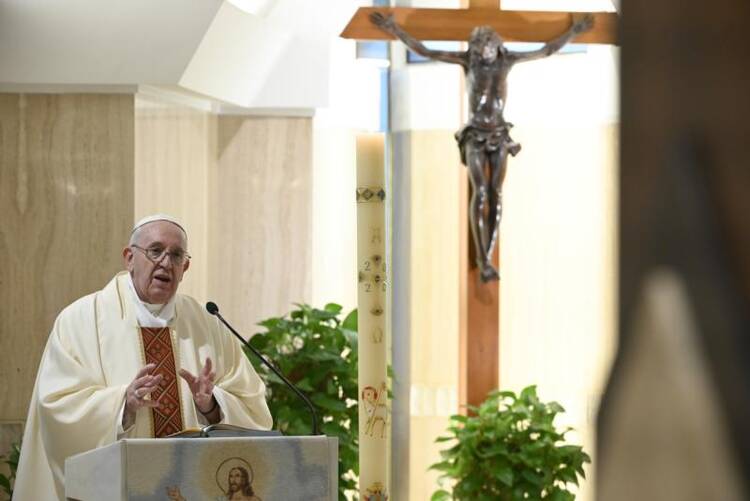VATICAN CITY (CNS) -- Only the humble submission of each individual to the Holy Spirit can bring harmony to communities suffering from division, Pope Francis said.
While money, vanity and gossip will always tear people apart, "the Holy Spirit is the master of harmony, he is capable of creating it," but it must be done inside the heart of each individual and "many things must change within us," the pope said in his homily at his morning Mass in the Domus Sanctae Marthae April 21.
At the start of the live broadcast of Mass, the pope first prayed that people would use the pandemic-induced time of increased silence in their lives to learn how to listen.
"There is a lot of silence in this period. You can even hear the silence," which may be something very different from what people are used to, he said. "May this silence," he prayed, "teach us to listen, make us grow in our ability to listen."
In his homily, the pope reflected on the day's first reading from the Acts of the Apostles, which describes the first community of Christians being of "one heart and mind," giving up their possessions in order to meet everyone's needs and living in harmony.
The early Christian community is "a model" that God lets people see so they know what is possible "if we are open to the Holy Spirit, if we are docile," the pope said.
"This is the ideal we must reach, but it is not easy," and, in fact, the early community soon succumbed to a number of internal divisions.
Many things can divide all sorts of communities, whether they are dioceses, parishes, priests or religious, the pope said.
But the three main things that the New Testament shows dividing the early Christian communities are money, vanity and gossip, he said.
"Money divides, the love of money divides the community, divides the church," he said, noting that history has shown that whenever there have been "doctrinal deviations" in the church, very often the reason behind them has been money.
"That is why poverty is the mother of a community, poverty is the wall that safeguards the community," he said.
Vanity can be seen in people showing off their lifestyle, the way they dress -- including the choice of liturgical vestments -- and in their desire to always seem better than others.
"Vanity makes you act like a peacock and wherever there is a peacock, there is always division," Pope Francis said.
Finally, the third thing that always divides a community is gossip, he said.
This urge to talk badly about others or to cut others down comes from the devil, he added.
However, "the Holy Spirit always comes with his power to save us from this worldliness of money, vanity and gossip, because the Spirit is not the world, but against the world. He is capable of working miracles," he said.
"Let us ask the Lord for this docility to the Spirit so that he can transform us and transform our communities" so that they can move forward in the kind of harmony Jesus desires for a Christian community.










